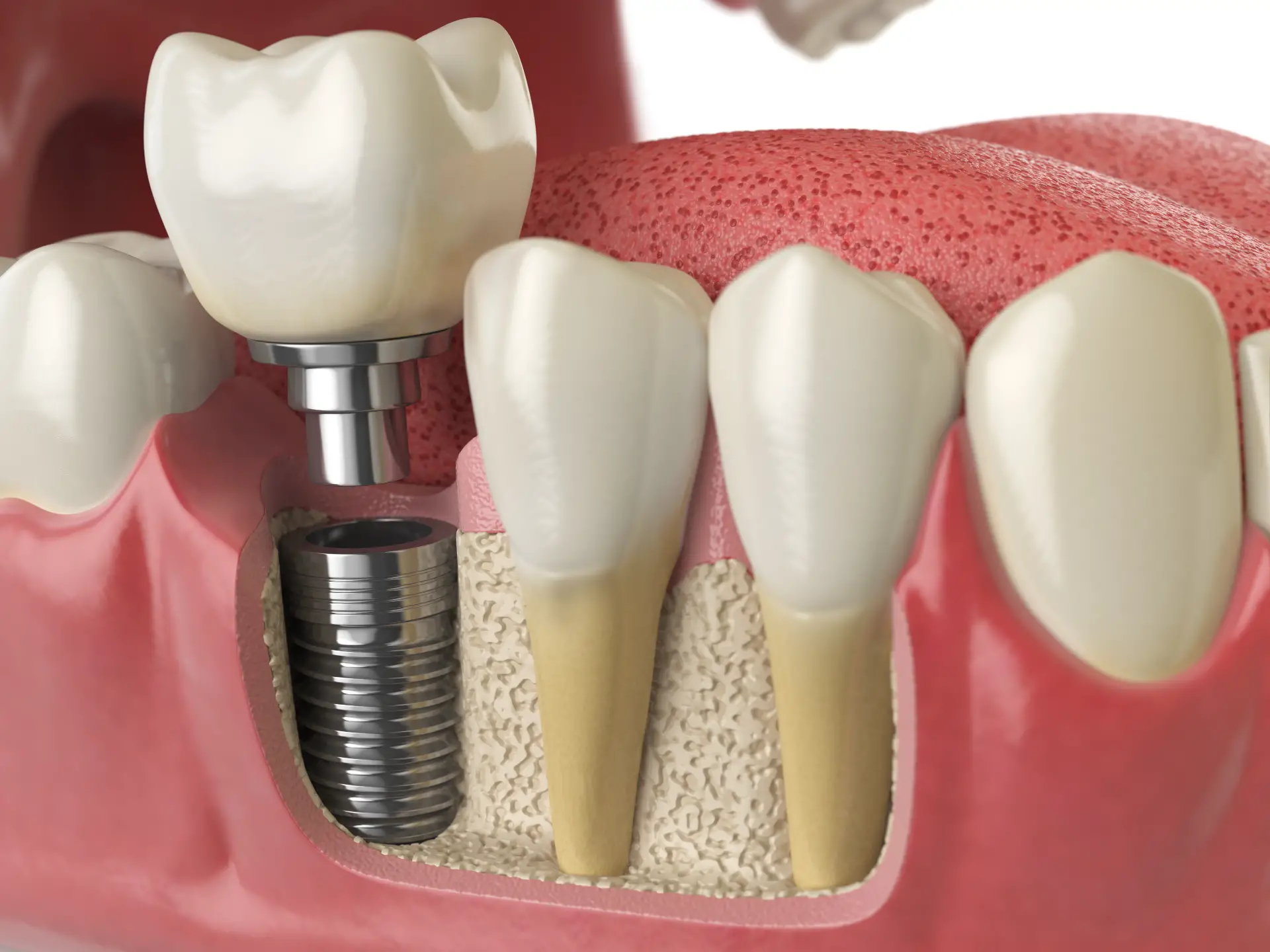Some people might not be suitable for dental implants due to specific needs like adequate bone density and jaw size. Plus, being in overall good health is essential for the minor dental surgery involved.
Dental implants offer a long-term solution for missing teeth, boasting benefits that go beyond mere aesthetics to include improved oral health and functionality.
So, can anyone get dental implants? This article will guide you through the details of who can benefit from dental implants, the necessary health conditions, lifestyle factors, and the comprehensive evaluation process involved.
Understanding whether you’re a candidate for dental implants can be confusing. This article aims to simplify the complexities surrounding dental implant eligibility, offering clarity and support to those considering this life-changing procedure.
Key Takeaways
- Good gum health and strong jawbones are must-haves for getting dental implants. If your bones are a bit on the weaker side, a bone graft could be a game-changer.
- Your overall health plays a big part in whether dental implants will work out. Managing any tricky health issues like diabetes or heart problems, and quitting smoking can really up your chances of success.
- Loving your dental hygiene routine is super important. Treat your dental implants like your natural teeth with regular brushing, flossing, and dentist visits to keep them in top shape.
- No matter your age, there might be a dental implant option for you. Young folks might need to wait a bit until their jawbones are fully grown, while older adults might just need a little extra care to make sure their bones are ready for implants.
- Even if you’ve got some health challenges, don’t count dental implants out. With the right care and planning, you might still be able to rock a new smile.
Eligibility of Dental Implants
Are you a good candidate for getting dental implants?
Let’s break down the key factors that determine if dental implants can be your go-to solution for missing teeth.
1. Healthy Gums and Adequate Bone Support
Top of the list for dental implant success is the state of your gums and jawbone. Implants need a strong foundation, meaning your gums must be free of periodontal disease and your jawbone robust enough to anchor the implants. If your bone is too thin or soft, don’t lose hope—bone grafting might be an option to build up the necessary support.
2. Overall Health Takes Center Stage
Your overall health plays a pivotal role in your eligibility for dental implants. Conditions like uncontrolled diabetes or heart disease can interfere with healing after surgery. Smoking is another significant factor that can delay healing and reduce the success rate of implants. If you’re a smoker, kicking the habit can significantly improve your odds of a successful implant.
3. Commitment to Oral Hygiene
A commitment to impeccable oral hygiene is non-negotiable. Dental implants require the same diligent care as your natural teeth, including regular brushing, flossing, and dental check-ups. This ongoing commitment helps ensure the longevity and success of your dental implants.
4. Age Considerations
While there’s no upper age limit for dental implants, they’re typically recommended for individuals who have reached full jawbone growth. This generally rules out most children and some teenagers, though each case is assessed on its own merits.
5. Navigating Special Cases
Even if you have health issues that might seem like roadblocks, don’t write off dental implants just yet. Many people with chronic conditions successfully receive implants after careful planning and preparation. The key is a thorough evaluation and possibly some extra steps to optimize your health beforehand.
With this knowledge, the next step is a detailed consultation with a dental professional. They can assess your specific situation, advise on any preparatory steps needed, and help you understand whether dental implants are a viable option for you.
Remember, each case is unique, so personal consultation is crucial to uncover the best path forward for your dental health.
Special Considerations and Exceptions
While the foundational criteria for dental implant eligibility are clear-cut, life rarely fits neatly into boxes. Individual health conditions, lifestyle factors, and even personal preferences mean that the road to dental implants can require a customized approach.
Age Consideration for Dental Implants
The question of age is a significant one when considering dental implants. Traditionally, the concern wasn’t just about being too old for implants but also about being too young. Here’s how age influences implant success and the special considerations across different life stages.
The Role of Bone Growth and Density
For dental implants to be successful, they must fuse with the jawbone in a process known as osseointegration. This requires the jawbone to have reached full growth, which poses a challenge for younger candidates, particularly adolescents. The jawbone typically completes its growth in the late teens to early twenties, making early implantation risky as it could interfere with natural bone development.
Conversely, in older adults, bone density becomes the focal point. As we age, our bone density naturally decreases, which could potentially compromise the stability of a dental implant. However, this doesn’t automatically exclude the elderly from receiving implants. Advances in dental technology, such as bone grafting and the development of more adaptable implant designs, have made it possible for older adults to enjoy the benefits of dental implants, provided their overall health is conducive to the procedure.
Special Considerations for Different Age Groups
Adolescents: For younger individuals eager for a permanent solution to tooth loss, patience is key. Dental professionals typically recommend waiting until jaw growth has been completed before proceeding with implants. Temporary solutions, such as bridges or partial dentures, may be advised in the interim. Regular dental evaluations can help determine the optimal time for implantation.
Read our blog here: Are Dental Implants Safe for Children
The Elderly: Age in itself is not a barrier to dental implants. The focus for older adults is ensuring they are in good overall health and that their bone density is sufficient to support the implants. Pre-procedural assessments may include bone density tests, and in some cases, treatments to improve bone health or procedures like bone grafting may be recommended before implantation.
Read our blog here: How Old is Too Old for Dental Implants
In both cases, a thorough evaluation by a dental professional is critical. This ensures that any age-related considerations are fully addressed, paving the way for successful dental implantation. By tailoring the approach to the unique needs of each age group, dental implants remain a viable and life-enhancing option for individuals across the lifespan, offering a return to function and an improvement in quality of life that many thought was beyond their reach.
Managing Chronic Conditions and Dental Implant Success
When it comes to dental implants, the state of one’s overall health plays a pivotal role in determining the success of the procedure. Chronic conditions, such as diabetes, heart disease, and autoimmune disorders, can present challenges to the healing process required for implants to integrate successfully with the jawbone.
However, having a chronic condition doesn’t automatically disqualify you from getting dental implants. With proper management and careful planning, many individuals with chronic conditions can still enjoy the benefits of dental implants.
The Impact of Chronic Conditions
Individuals with diabetes, especially those with uncontrolled blood sugar levels, face a higher risk of infections and slower healing times. This can compromise the osseointegration process. Close monitoring and management of blood sugar levels before and after the implant procedure can mitigate these risks.
For those with heart conditions, the concern revolves around the use of anesthesia during implant surgery and the risk of infection. A thorough medical evaluation and close coordination with your cardiologist and dental surgeon can help tailor a safe and effective treatment plan.
For those with autoimmune disorders like rheumatoid arthritis or lupus can affect the body’s healing capacity and may influence the success of dental implants. Adjustments in medication and careful monitoring can help manage these effects, ensuring a more favorable outcome.
Smoking and Dental Implant Success
Smoking is widely recognized as a significant risk factor for dental implant failure. The chemicals in tobacco can impair blood flow to the gums, affecting the healing process and jeopardizing the integration of the implant with the jawbone. Smokers also have a higher risk of developing peri-implantitis, a destructive condition that affects the tissues surrounding the implant.
Recommendations for smokers:
- Quit Smoking: The best recommendation for smokers considering dental implants is to quit. Quitting smoking not only improves the chances of implant success but also benefits your overall health.
- Delay Implantation: If quitting smoking before getting implants isn’t possible, some dental professionals recommend delaying the procedure to reduce the risk of complications. This delay can provide time to reduce smoking frequency and improve oral health, setting a better foundation for implant success.
- Enhanced Oral Hygiene: Smokers who proceed with dental implants should adhere to an enhanced oral hygiene regimen. This includes regular dental check-ups, meticulous brushing and flossing, and possibly additional treatments to maintain gum health.
Managing chronic conditions and addressing lifestyle factors like smoking are crucial steps in ensuring the success of dental implants. By working closely with your dental professional and healthcare provider, you can develop a comprehensive plan that addresses these challenges head-on. With the right preparation and care, dental implants can offer a durable and aesthetically pleasing solution for missing teeth, even for those navigating the complexities of chronic conditions and smoking.
Your Path to a Brighter Smile with Dental Implants
Wrapping up, we see that dental implants are more than just a way to fill gaps—they’re a step towards gaining back your confidence and improving how you feel about your smile. Getting to grips with what makes you a good match for dental implants and staying on top of your oral health can really make a difference in getting you across the finish line to success.
Dental implants stand out as a hopeful option for many, cutting across different ages and health situations. Chatting with your dentist can open up a custom plan that fits just right with your health story, making the idea of dental implants a real possibility. Let this be the nudge you need to explore how dental implants can light up your smile and your life.
Ready to Transform Your Smile?
Eager to explore how dental implants can revolutionize your smile and boost your confidence? At Image Dental, we’re dedicated to guiding you through every step of the journey towards achieving the radiant smile you deserve. With personalized consultations and state-of-the-art care, we’re here to ensure your dental implant process is smooth, successful, and tailored to your unique needs. Don’t let another day pass wishing for a better smile.
Book now by calling us at (209) 955-1500 and take the first step towards the smile of your dreams with Image Dental.



